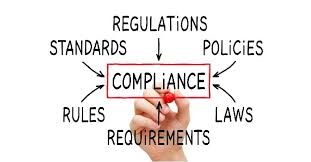Navigating Business Regulations: A Guide to Compliance and Success

The Impact of Regulations on Businesses
In today’s business landscape, regulations play a crucial role in shaping the operations and behavior of companies across various industries. Regulations are rules and guidelines set by government authorities to ensure fair competition, protect consumers, safeguard the environment, and promote public safety.
While regulations are intended to create a level playing field and maintain order in the marketplace, they can also pose challenges for businesses. Compliance with regulations often requires significant time, resources, and expertise. Failure to adhere to regulatory requirements can result in fines, penalties, or even legal action.
On the other hand, regulations can also bring benefits to businesses. They can help establish trust with customers by ensuring product quality and safety. Regulations can also drive innovation by setting standards for sustainability and ethical practices.
However, navigating the complex web of regulations at local, state, national, and international levels can be daunting for businesses of all sizes. Small businesses may struggle to keep up with changing regulations due to limited resources, while large corporations may face challenges in complying with overlapping or conflicting rules.
As regulatory environments continue to evolve in response to new technologies, social trends, and global events, businesses must stay informed and proactive in managing compliance risks. This may involve investing in compliance programs, seeking legal counsel, engaging with industry associations, and advocating for regulatory reforms.
In conclusion, regulations have a profound impact on how businesses operate and compete in today’s economy. By understanding the implications of regulations and taking proactive steps to comply with them effectively, businesses can navigate regulatory challenges while seizing opportunities for growth and sustainability.
8 Key Benefits of Regulations: Ensuring Safety, Fairness, and Innovation
- 1. Promote consumer safety and protection
- 2. Ensure fair competition in the marketplace
- 3. Set standards for product quality and reliability
- 4. Safeguard the environment and promote sustainability
- 5. Enhance public health and safety measures
- 6. Provide guidelines for ethical business practices
- 7. Help prevent fraud, corruption, and abuse
- 8. Drive innovation and technological advancement
Challenges of Regulations: Financial Strain, Complexity, Innovation Barriers, and Market Entry Obstacles
- Increased compliance costs can strain the financial resources of businesses.
- Complex and changing regulations may lead to confusion and errors in interpretation.
- Regulations can stifle innovation by imposing rigid standards and requirements.
- Over-regulation can create barriers to entry for new businesses, limiting competition and market diversity.
1. Promote consumer safety and protection
Regulations play a crucial role in promoting consumer safety and protection by setting standards and requirements that businesses must adhere to in order to ensure the quality and safety of products and services. These regulations help prevent deceptive practices, ensure transparency in advertising, and safeguard consumers from potential harm or fraud. By establishing guidelines for product testing, labeling, and manufacturing processes, regulations give consumers confidence that the goods and services they purchase meet certain safety standards, ultimately fostering trust between businesses and their customers.
2. Ensure fair competition in the marketplace
Regulations play a crucial role in ensuring fair competition in the marketplace by setting standards and guidelines that all businesses must follow. By establishing a level playing field, regulations prevent monopolies, price-fixing, and other anti-competitive practices that could harm consumers and stifle innovation. Fair competition encourages businesses to compete based on the quality of their products or services, leading to better choices for consumers and driving overall economic growth. Additionally, regulations help maintain transparency and accountability in business practices, fostering trust among stakeholders and promoting a healthy business environment.
3. Set standards for product quality and reliability
Regulations play a vital role in setting standards for product quality and reliability, ensuring that businesses deliver goods and services that meet established benchmarks for safety, performance, and durability. By mandating adherence to these standards, regulations help protect consumers from substandard or unsafe products while fostering trust and confidence in the marketplace. Consistent quality standards also promote fair competition among businesses by leveling the playing field and encouraging innovation to meet or exceed regulatory requirements. Overall, this pro of regulations serves to enhance consumer welfare, drive industry improvements, and uphold the integrity of products in the market.
4. Safeguard the environment and promote sustainability
Regulations that safeguard the environment and promote sustainability play a vital role in ensuring the long-term health of our planet. By setting standards for reducing pollution, conserving natural resources, and mitigating environmental impacts, these regulations help businesses operate in a way that minimizes harm to ecosystems and promotes a more sustainable future. Through compliance with environmental regulations, businesses can contribute to preserving biodiversity, combating climate change, and creating a healthier environment for future generations to thrive.
5. Enhance public health and safety measures
Enhancing public health and safety measures is a significant benefit of regulations. By setting standards and requirements for industries such as healthcare, food production, transportation, and environmental protection, regulations help ensure that products and services meet essential safety criteria. This proactive approach not only protects consumers from potential harm but also contributes to overall public well-being by reducing risks and promoting a healthier and safer society for everyone.
6. Provide guidelines for ethical business practices
Regulations play a crucial role in providing guidelines for ethical business practices. By setting standards and expectations for conduct within industries, regulations help ensure that businesses operate with integrity, transparency, and accountability. These guidelines not only protect consumers from deceptive or unethical behavior but also foster a culture of trust and responsibility within the business community. Ethical business practices not only benefit individual companies by enhancing their reputation and credibility but also contribute to the overall sustainability and success of the economy as a whole.
7. Help prevent fraud, corruption, and abuse
Regulations serve as a critical safeguard against fraud, corruption, and abuse within various sectors of society. By establishing clear guidelines and oversight mechanisms, regulations create transparency and accountability that deter individuals or organizations from engaging in unethical practices. This proactive approach not only protects consumers and stakeholders but also upholds the integrity of industries by promoting fair competition and ethical behavior. Overall, the implementation of regulations to prevent fraud, corruption, and abuse contributes to a more trustworthy and sustainable business environment.
8. Drive innovation and technological advancement
Regulations drive innovation and technological advancement by setting standards and requirements that challenge businesses to develop new solutions and technologies. When regulations mandate improvements in areas such as safety, sustainability, or efficiency, companies are incentivized to invest in research and development to meet these requirements. This push for innovation not only benefits the businesses themselves by improving their products and services but also contributes to overall progress in society by fostering advancements that can enhance quality of life and address pressing challenges.
Increased compliance costs can strain the financial resources of businesses.
Increased compliance costs resulting from regulations can significantly strain the financial resources of businesses, especially smaller enterprises. The expenses associated with ensuring regulatory compliance, such as hiring specialized staff, implementing new systems, conducting audits, and paying fines for non-compliance, can create a heavy financial burden. These additional costs may divert funds that could otherwise be allocated to innovation, expansion, or employee development. As a result, businesses may find it challenging to remain competitive and sustainable in the face of escalating compliance expenses.
Complex and changing regulations may lead to confusion and errors in interpretation.
Complex and changing regulations within industries can often lead to confusion and errors in interpretation. The intricate nature of regulatory frameworks, coupled with frequent updates and amendments, can create challenges for businesses in understanding and adhering to the rules. This complexity may result in unintentional violations, compliance gaps, or misinterpretations that could expose companies to legal risks and financial penalties. Moreover, the lack of clarity in regulations can hinder operational efficiency and decision-making processes, adding a layer of uncertainty that businesses must navigate carefully to ensure compliance while maintaining competitiveness.
Regulations can stifle innovation by imposing rigid standards and requirements.
Regulations can act as a double-edged sword when it comes to innovation, as they have the potential to stifle creativity and progress by imposing strict standards and requirements on businesses. The rigid nature of some regulations may limit the ability of companies to experiment with new ideas or technologies, hindering their capacity to innovate and adapt to changing market demands. This can create barriers for startups and small businesses that lack the resources to navigate complex regulatory landscapes, ultimately impeding the development of groundbreaking solutions and advancements in various industries.
Over-regulation can create barriers to entry for new businesses, limiting competition and market diversity.
Over-regulation can create significant barriers to entry for new businesses, ultimately stifling competition and restricting market diversity. When regulations impose excessive requirements or costs on startups and small businesses, aspiring entrepreneurs may find it challenging to enter the market and compete with established players. This lack of competition can lead to monopolistic practices, higher prices for consumers, and reduced innovation within the industry. Additionally, stringent regulations may deter potential investors from supporting new ventures, further hindering economic growth and job creation. Finding a balance between necessary regulations and fostering a conducive environment for new business development is essential to promote healthy competition and drive overall market innovation.

